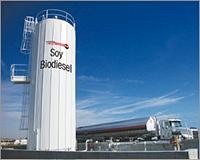 |
Camden PA (SPX) Sep 07, 2010 One mention of E. coli conjures images of sickness and food poisoning, but the malevolent bacteria may also be the key to the future of renewable energy. Desmond Lun, an associate professor of computer science at Rutgers University-Camden, is researching how to alter the genetic makeup of E. coli to produce biodiesel fuel derived from fatty acids. "If we can engineer biological organisms to produce biodiesel fuels, we'll have a new way of storing and using energy," Lun says. Creating renewable energy by making fuels, like making ethanol out of corn, has been a common practice in trying to achieve sustainability. However, Lun says, "It's widely acknowledged that making fuel out of food sources is not very sustainable. It's too expensive and it competes with our food sources." One alternative is to modify the E. coli microorganism to make it overproduce fatty acids, which are used to make biodiesel. "Fatty acid molecules aren't that different from a lot of fuel molecules," says Lun, a Philadelphia resident. "Biodiesel is something that we can generate quite easily. E. coli has been used as a lab organism for more than 60 years and it's well-studied. We know a lot about its genetics and how to manipulate it. We've got to make quite drastic changes to do it and it requires major intervention." That's where Lun's computer science expertise comes in. Lun builds computational models of the E. coli organisms to determine what would happen if changes are made. Those changes could include removing enzymes to enhance fatty acid production. The E. coli microorganism can be modified to make it overproduce fatty acids. "We call it synthetic biology," he says. "It's sort of the next stage of genetic engineering. Instead of making small changes to specific genes, we're really modifying large sections of genome. We're putting in entirely new traits rather than modifying existing traits." Lun explains, "The unique aspect of my work is this emphasis on computational modeling as a way of guiding it. Even these simple bacteria are immensely complex. Computational modeling can offer a way to speed up the process and make it a faster, better process." Fatty acid production in the altered bacteria would be enhanced, paving the way for biofuel development. Lun is collaborating with researchers from Harvard University on his E. coli project. He teaches computational and integrative biology and biological networks at the Camden Campus of Rutgers, The State University of New Jersey. Lun received bachelor's degrees in mathematics and computer engineering from the University of Melbourne, Australia. He received his master's in electrical engineering and doctorate in computer science from MIT.
Share This Article With Planet Earth
Related Links Rutgers Bio Fuel Technology and Application News
 Next Gen Scientists Join Forces To Support Biodiesel
Next Gen Scientists Join Forces To Support BiodieselJefferson City MO (SPX) Sep 02, 2010 The next generation of thought leaders is gearing up to lead America's energy efforts. And biodiesel, our nation's only commercially available advanced biofuel, is front and center. Student scientists from Dartmouth College to Oregon State University are leading a new Next Generation Scientists for Biodiesel initiative. The group has formed to demonstrate and grow support for biodiesel amo ... read more |
|
| The content herein, unless otherwise known to be public domain, are Copyright 1995-2010 - SpaceDaily. AFP and UPI Wire Stories are copyright Agence France-Presse and United Press International. ESA Portal Reports are copyright European Space Agency. All NASA sourced material is public domain. Additional copyrights may apply in whole or part to other bona fide parties. Advertising does not imply endorsement,agreement or approval of any opinions, statements or information provided by SpaceDaily on any Web page published or hosted by SpaceDaily. Privacy Statement |